4 Minute Read
By Jodie Case, Research Assistant, The Owl Box Initiative
 The Owl Box Initiative is delighted to be working with a number of volunteer ornithologists across Hampshire, Wiltshire and Dorset to help monitor local barn owl populations. In the world of owl nest box monitoring, dedicated conservationists all over the country give up a great deal of their free time to lift heavy ladders on and off of car roof racks (over and over again!), check nest boxes, coordinate other volunteers, contribute to our national bird ringing scheme, and feedback our findings to landowners. All in aid of supporting the UK’s owl and raptor populations.
The Owl Box Initiative is delighted to be working with a number of volunteer ornithologists across Hampshire, Wiltshire and Dorset to help monitor local barn owl populations. In the world of owl nest box monitoring, dedicated conservationists all over the country give up a great deal of their free time to lift heavy ladders on and off of car roof racks (over and over again!), check nest boxes, coordinate other volunteers, contribute to our national bird ringing scheme, and feedback our findings to landowners. All in aid of supporting the UK’s owl and raptor populations.
The Owl Box Initiative strives to be a conduit for collaboration and knowledge sharing between land managers, volunteers and conservation organisations, and recently, I had the honour of meeting with Major (Rtd) Nigel Lewis, a prominent volunteer ornithologist who runs the Lewis Raptor and Owl Group, based in Wiltshire. Nigel’s name was regularly mentioned by farmers in our study area in relation to local monitoring, and upon finding out that Nigel monitored a barn owl box on the farm where I live, I arranged to sit down with him over a cup of tea and find out more about his long-standing conservation work.
Nigel previously served in the British Army, in the Royal Anglian Regiment and following retirement he worked as an officer for the Director of Infantry until 2000. Alongside and following his career, Nigel has dedicated over 30 years of his life to conserving Barn Owls and other raptors. Asking him how his interest began, Nigel explained he has always had a keen interest in raptors, showing me a wonderful, illustrated guide to the ‘Raptors of the World’ by Dr Philip Burton, an individual that Nigel thanks for inspiring him in his work. Through the 1970’s Nigel began to erect nest boxes in various places where he resided, and after being posted to Warminster in the early 1980’s, Nigel joined the HQ Director of Infantry IMBER Conservation Group and continued erecting and monitoring boxes across areas of Salisbury Plain, which has been a large focus area for Nigel’s conservation work over the years.
At its peak Nigel has led the monitoring of just over 1000 nest boxes, many of which he had installed himself, across Hampshire, Wiltshire and Dorset. Nigel and his dedicated, yet small team, have gathered data from birds across this area, providing incredibly important annual information on raptor and owl breeding success which was sent to the British Trust for Ornithology and locally to the Wiltshire and Swindon Biological Records Centre. He shared his findings through talks and advising on nest boxes. This dedication led to Nigel being awarded an MBE in 2007 for his contributions to raptor and owl conservation.
Over the years Nigel has had ample opportunity to observe barn owls and raptors during his monitoring work, and very kindly shared with me some wonderful photographs:
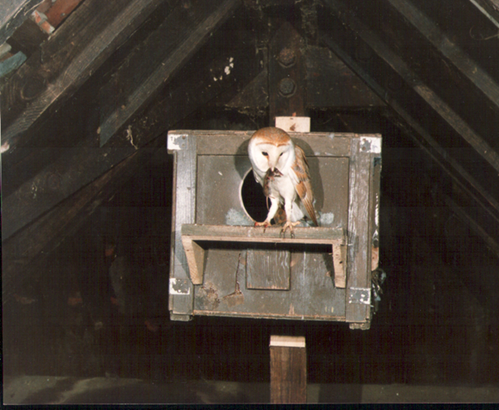
Barn Owl returning with prey to the nest box within an old coach house © Nigel Lewis
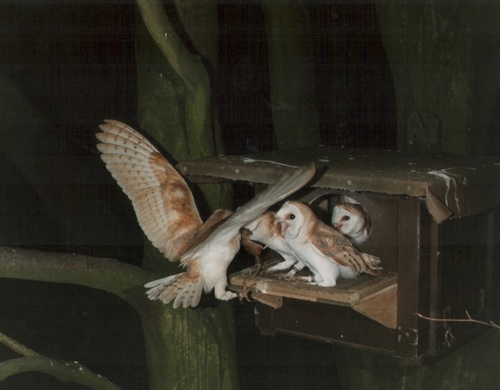
An adult Barn Owl returning to the nest box to feed young © Nigel Lewis
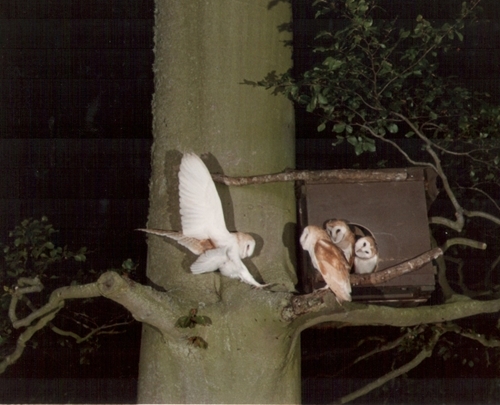
Owlets at the nest box exercising their wings before fledging © Nigel Lewis
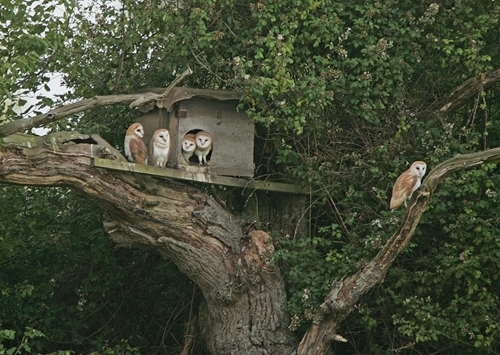
Owlets at the nest box, made out of a disused ammunition box © Ken Campbell
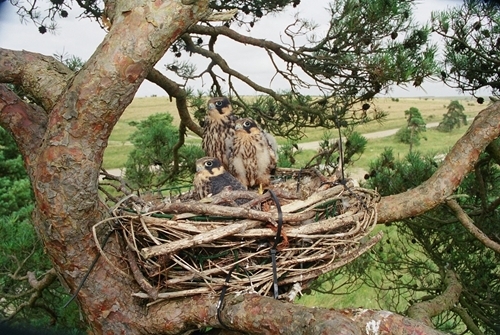
A fantastic glimpse into a Hobby nest basket © Nigel Lewis
Looking to the future, I asked Nigel, having been involved in raptor and owl conservation for many years, does he feel raptor and owl conservation efforts are having a positive effect. Nigel said, ‘Yes, barn owl numbers have doubled in UK but more needs to be done; the fact that people are putting up nest boxes is positive, but these birds need more hunting habitat, they don’t like neat and tidy’. Nigel explained that land managers need to manage for rough grassland habitats to produce the vole numbers needed to support owl and raptor populations, leave untidy corners and suggested that the incorporation of rewilding in the landscape would have a positive effect.
It was fantastic to speak with and learn from Nigel and to share with him our project’s aims and stories about our field work activities we have been carrying out over the breeding season, and thank him for meeting with me.
Without individuals like Nigel and his team, we would know a lot less about these wonderful species and how to help them.
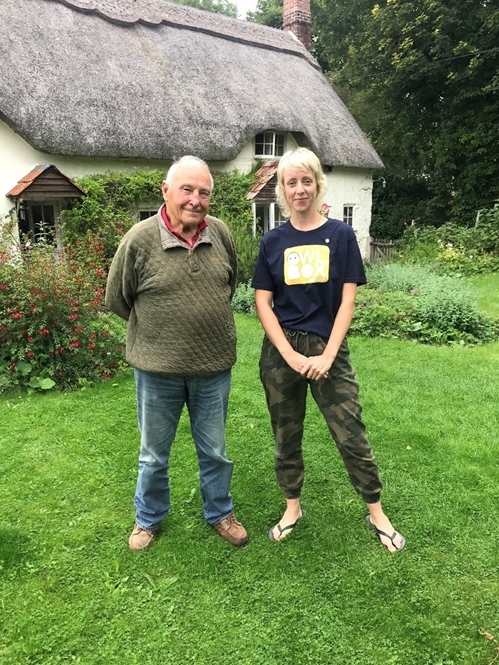
Major (Rtd) Nigel Lewis of the Lewis Raptor and Owl Group and Jodie Case from the Owl Box Initiative
Support the Owl Box Initiative
You can help support the project by purchasing an Owl Box Initiative Supporter Badge or Living Nature Soft Toy Barn Owl from the GWCT.